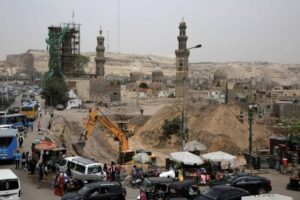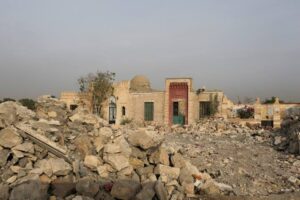Bulldozers have been tearing through the historic Islamic cemeteries in Cairo, endangering thousands of tombs, as part of a road and bridge expansion project aimed at alleviating congestion in the city.
This development has sparked outrage among conservationists and grieving family members who have deep ties to the sacred burial grounds.
Known as the City of the Dead, these cemeteries have served as the final resting place for Egypt’s departed since the advent of Islam in the seventh century A.D. Spanning over 10 square kilometers, this UNESCO World Heritage site holds great significance to Cairo’s prominent families, who continue to inter their loved ones within its hallowed grounds.

In recent months, the government has uprooted numerous graves using heavy machinery to make way for wide highways connecting Cairo to a newly constructed capital 50 kilometers to the east. Some tomb owners, who wish to relocate the remains of their family members, claim they are provided with little notice.
The outcry on social media prompted President Abdel Fattah al-Sisi to establish a committee to assess the situation and explore alternative solutions. While the government maintains that it does not intend to destroy historically designated monuments, conservationists argue that only a mere 102 out of more than 2.5 million tombs in the area have received this recognition.
Also, read; Bill Gates Visits Nigeria, Meets With New President Over Healthcare Improvements
UNESCO, which advocates for the preservation of this remarkable site, has scheduled a review of the case for September 2023. Specialists note that the tombs, constructed over centuries of Islamic history, showcase a wide array of unique architectural styles, often featuring intricate Arabesque carvings, as well as marble, wood, and metal artwork.
Among the notable figures interred within these cemeteries are 19th and early 20th-century politicians, including nationalist leader Ahmed Urabi, as well as the magnificent mausoleums of Mamluk sultans who reigned over Egypt from 1250 to 1517 A.D. Imam el-Shafei, the founder of one of Sunni Islam’s four schools of Islamic law, also rests there, having passed away in 820 A.D.

Efforts to salvage valuable artifacts, such as two 9th-century tombstones recently discovered amidst the debris of demolished tombs, are being led by culture enthusiasts and volunteers. Nevertheless, experts express concerns that the rich history embodied by the City of the Dead may be irretrievably lost, with one specialist predicting that only a mere 20% of the current site may remain intact in the next five years.
As the fate of Cairo’s ancient Islamic cemeteries hangs in the balance, preservationists, archaeologists, and the international community await the UNESCO review to determine the best course of action to safeguard this invaluable heritage.
